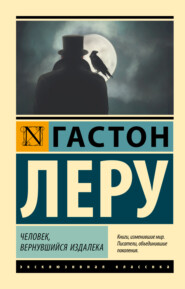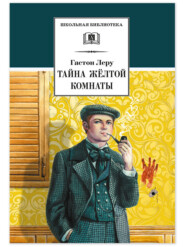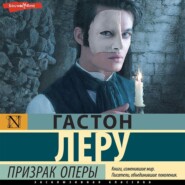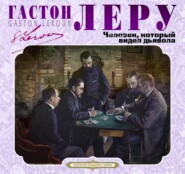По всем вопросам обращайтесь на: info@litportal.ru
(©) 2003-2024.
✖
The Double Life
Автор
Год написания книги
2018
Настройки чтения
Размер шрифта
Высота строк
Поля
“Oh, yes, yes,” said Aldolphe, “I have heard of him. I even know his real name, his family name.”
“Ah, what is it?” anxiously inquired Théophraste.
Adolphe for reply pushed Théophraste into the hallway of an old house, in the Rue Guinegard, a few steps from the Hotel de la Monniare. They climbed a tottering staircase, and entered a room in which the curtains were drawn. Somebody had spent the night in the room.
On a little table in the corner, the trembling flame of a wax candle lit up a portrait. It was the picture of a man about thirty years of age. He had a robust figure, high forehead, strong nose, a smooth chin, and large mouth and moustache. His thick hair was covered by a coarse woolen cap, and he wore a coat over a coarse linen shirt, which appeared to be a prison garb.
“Wait,” said Théophraste, without raising his tone, “how is it that my portrait is in this house?”
“Your picture?” asked Adolphe. “Are you sure?”
“Who could be more sure of it than I?” said Théophraste again, without being excited.
“Very well,” said M. Lecamus, with emotions that it would be hard to describe. “That portrait, which is your portrait, is the portrait of Cartouche.” When M. Lecamus turned to see the effect his words would produce on his friend, he saw Théophraste stretched on the floor in a dead swoon.
For a long time he worked to bring him to. He blew out the candle and opened the windows, allowing the good air to come in. Théophraste came to himself, and his first words were, “Adolphe, above all things do not speak of this to my wife.”
CHAPTER X
Cartouche’s Past
THE following day Théophraste and Marceline returned to the quiet life of the Villa Flots-d’Azure. Théophraste had not mentioned a word of the discovery, and his wife refrained from questioning him. Marceline knew nothing yet of the terrible discovery. Théophraste’s face was full of consternation, and it was evident to Marceline that he had terrible things on his mind.
Adolphe was to join them in a few days; two days passed very quietly in the villa. Marceline attended to her household duties, and Théophraste silently prepared his fishing tackle, as he had promised Adolphe a few days’ fishing in the Marne. On the third day, Théophraste, who had passed a good night, showed a less agitated countenance, and began to smile and was cheered at the prospect of Adolphe’s coming. M. Lecamus arrived before noon, and they both received him with delight.
Taking their places at lunch their conversation turned on angling, but nothing was said of the mysterious proceedings of the week before. After lunch they prepared for their fishing expedition; Théophraste took care of the lines, the rods and the bait, and Adolphe took the nets.
Going down to the water’s edge, Théophraste turned to Adolphe and said, “Tell me, have you any news? While we are fishing I will listen to you. I have prepared a lot of sport, but I don’t think we will do very much to-day, if you have important news for me.”
Adolphe replied, “There is some good, and some bad news. But I must tell you that there is more bad than good. No doubt many stories have been invented about you, but the real truth is not entirely pleasant.”
“Are you well informed, and is your information authentic?”
“I have been to the very fountain-head, I have seen the authentic documents. I am going to tell you what I know. If I am mistaken, correct me.”
Théophraste threw his half-prepared bait into the water, and said, “Go on. I must have a full explanation.”
“First,” said Adolphe, “you were born in the month of October, 1693. You were called Louis Dominique Cartouche.”
“But it is needless to call me Cartouche, no one need know that. Call me L’Enfant. I like it much better and no one will understand.”
“Yes,” insisted Adolphe, “but you know that your name is Cartouche. It is not an assumed name. It is said that you studied hard in Clermont College. That you were the schoolfellow of Voltaire, and there is a legend that while you learned to read, in the course of time, thanks to the gypsies who taught you reading, you were never able to write.”
“Well, that’s funny,” cried Théophraste, “for if I never learned to write, how could I have drawn up the document in the dungeon of the Conciergerie?”
“At the time of your trial, you declared that you did not know how to write. You signed your depositions with a cross and you have never written a line to show who it was.”
“But,” Théophraste said, “it was never necessary to write. In my position I should have dreaded to compromise myself. But the document is there.”
“Evidently. Let us return to your eleventh year. One day you were in the Saint Laurent Faire, with some comrades, when you fell in with a band of gypsies. The gypsies carried you away. They stole you. They taught you the play of the cudgel, the sword, to shoot a pistol, to jump, and to rob the pockets of the bourgeoisie without being discovered. At your twelfth year you were an adept at this, and without an equal for bringing back handkerchiefs, snuff boxes, and watches. The band of gypsies found themselves at Rouen, when little Louis Dominique fell ill. He was taken to a hospital in Rouen, and it was there that an uncle discovered him. He recognized him, and swore to restore him to his parents.”
Here Théophraste interrupted with a word as to his uncle, and Lecamus becoming impatient, begged him to cease his continual interruptions, declaring it would take some time to tell the story of Cartouche if he would not listen to it silently.
“I would like to see you in my place,” said Théophraste.
Adolphe continued: “In a while Cartouche became the chief of a band of brigands. He commanded about three thousand men, had more than fifty lieutenants; it was their habit to dress exactly alike, in cinnamon-colored coats, and doublets of silk and amaranthine, showing a piece of black taffeta underneath the left eye. They brought against him more than one hundred and fifty personal assassinations, and put a price upon his head. He was tried and broken on the wheel.” “Upon hearing this Théophraste showed evident signs of alarm. He dropped his fishing tackle, losing it in the swift current of the river. He could not give his mind to fishing any more that day, and so they resolved to give up the attempt. They did not wait for sundown, to return to the Villa Flots-d’Azure. Swinging their meagre spoils lightly in their nets they sadly retraced their steps. Cartouche filled their minds, and their return journey was occupied in thoughts of this dual personality.
CHAPTER XI
Signor Petito Appears
WHILE waiting for the stage from Crecy to stop for them, they called at the wayside inn, and had some refreshment, while Adolphe took up the story of L’Enfant at the point where he had left off.
“That good uncle,” said he, “had fellow-feeling for one of his family, and he rescued young Cartouche from his miserable lot and made him return to his parents. His father was a cooper by trade, and young Louis, having profited by his youthful misfortunes, swore that henceforth he would be a good son and a diligent apprentice. He helped his father to make casks, working from daybreak to sunset.
“He was frequently seen, during lunch hour, amusing his companions with pretty tricks of sleight-of-hand which he had learned during the few months he had been with the gypsies. He had become so adept at this science that on special occasions little Louis and his family were invited to dinners and suppers before friends, for they looked forward to the enjoyment of these tricks of Louis’, and he became a great success in the quarter, and he, on his part, was proud of his growing renown.
“In the meantime he had attained that happy period where the least sensitive of human beings feel the beating of their hearts awaken to the most tender sentiments. Louis Dominique was in love. The object of his affections was a charming needlewoman of the Rue Porte Foin, coquettish, with blue eyes, golden hair, and a fine figure. I have said that this needlewoman was a coquette. She loved dress, jewels and laces, and it was her desire always to be better clothed than her companions. The modest income of Louis Dominique did not permit of his paying for the extravagant fancies of his poor seamstress, and so Cartouche stole from his father. The latter soon found out and took steps by which he could have his boy placed in the Convent of the Lazaretto, in the Faubourg St. Denis.”
“Ah,” said Théophraste, “instead of combating with kindness the wickedness of this child, they drive him to despair by incarcerating him where he only meets with bad examples, and where the feeling of revolt increases, and boils over, stifling all other feelings in his inexperienced mind. I wager that if they had not put Louis in the House of Correction, that all the trouble would never have happened.”
“Reassure yourself,” said Adolphe. “Cartouche was never shut up in the Convent of the Lazaretto, for while his father had discovered this crime of Louis’, he did not tell him of it; but one Sunday morning, he asked his son to take a walk with him. Dominique readily acquiesced, and they were soon seen walking down the street together.
“‘Where are we going, father?’ asked Louis. ‘No matter where. By way of the Faubourg St. Denis.’ Louis pricked up his ears. He knew that at the end of the Faubourg St. Denis was the Lazaretto, and he also knew that sometimes fathers escorted their boys to the Lazaretto.
“He at once felt suspicious, for his conscience was not altogether tranquil, and when they arrived at the corner of the Faubourg St. Denis, and the battlement of the St. Lazaretto rose before them, it seemed to him that his father looked unnatural, and he felt uncomfortable at once. He told his father to continue his walk, slowly, without hurrying, as he wished to stop at the corner.
When his father returned, the son had disappeared, and he never saw him again.”
About this time the coach had arrived, and Adolphe discontinued his tale while they mounted to the top. Théophraste recognized M. Bache, and Mme. Froude, and he at once bowed to them, but they did not respond. He called them by name, but they remained mute. Théophraste could not understand this, and turned to ask Adolphe what he thought of it, and why they did not recognize him.
“That does not astonish me at all,” said Adolphe. “It is no wonder to me, since the dinner the other day, that nobody bows to you. Your extraordinary behavior was enough to upset them all. Do you not remember how you were mounted on the table and sang that vulgar song? There were some young ladies present, Miles. Froude and Tabouret.”
“Ah,” said Théophraste, “that accounts for Mme. Bache’s pretending not to see me the other day in Paris, when she called at the Pharmacy Crecy and I happened to meet her there. Never mind, Adolphe, continue where you left off about my father. What happened to him?”
“Well, you forgot about your seamstress at the Rue Point Foin, and you thought of her no more.
She worried over your disappearance about a fortnight, and then got somebody else, as is done under similar circumstances to-day. The necessity to make your way in the world recalled your old talents, and soon you were robbing passers-by of the things in their pockets. You operated so adroitly, that you incurred the admiration of a great sharper, who having seen you work, stopped you at the corner of the Rue Gallaud, and demanded of you your money or your life. ‘You shall have my purse only when you have my life,’ said you to him, and you drew your sword, a small sword that you had taken the day before from a French Guardsman. The great sharper flattered you upon your courage, and then upon your dexterity, and he begged you to accompany him home to the Rue Bout du Monde. He told you on the way that he sought an associate, and you could do the business. He also told you that he had a wife, and the wife had a very pretty sister. After a while you married this sister, though neither notary nor priest was sent for. The attachment did not last over six months, because the sharper, his wife, and his sister-in-law were sent to the gallows. You had already left them by this time, and had joined the army. You were caught one day, drunk, by a recruiting officer, and he took you to the barracks, and made you sign on.”
By this time it was seven o’clock, and Adolphe interrupted the course of his recital at that point, as they had to alight from the coach.
“Tell me,” said Théophraste, “I am curious to know how I was built. Was I a handsome man, a tall man?”
“They represent you thus at the theater, in M. d’Ennury’s play, but on the contrary, according to the poet Granvel, you were a conceited man, and always fond of singing your own praises. You were dark, lean, small, but of great courage. You were enterprising and bold, and very alert.”
“You have not told me,” said Théophraste, “how you got that picture in the house on the Rue Guinegaud.”
“It is a copy of a photograph by Nedar. He photographed a wax mask, which ought to resemble you, as that mask was made from your face by the order of the Regent. Nedar photographed that mask in 1859. The mask was found in the Chateau de St. Germain.”
“Ah, what is it?” anxiously inquired Théophraste.
Adolphe for reply pushed Théophraste into the hallway of an old house, in the Rue Guinegard, a few steps from the Hotel de la Monniare. They climbed a tottering staircase, and entered a room in which the curtains were drawn. Somebody had spent the night in the room.
On a little table in the corner, the trembling flame of a wax candle lit up a portrait. It was the picture of a man about thirty years of age. He had a robust figure, high forehead, strong nose, a smooth chin, and large mouth and moustache. His thick hair was covered by a coarse woolen cap, and he wore a coat over a coarse linen shirt, which appeared to be a prison garb.
“Wait,” said Théophraste, without raising his tone, “how is it that my portrait is in this house?”
“Your picture?” asked Adolphe. “Are you sure?”
“Who could be more sure of it than I?” said Théophraste again, without being excited.
“Very well,” said M. Lecamus, with emotions that it would be hard to describe. “That portrait, which is your portrait, is the portrait of Cartouche.” When M. Lecamus turned to see the effect his words would produce on his friend, he saw Théophraste stretched on the floor in a dead swoon.
For a long time he worked to bring him to. He blew out the candle and opened the windows, allowing the good air to come in. Théophraste came to himself, and his first words were, “Adolphe, above all things do not speak of this to my wife.”
CHAPTER X
Cartouche’s Past
THE following day Théophraste and Marceline returned to the quiet life of the Villa Flots-d’Azure. Théophraste had not mentioned a word of the discovery, and his wife refrained from questioning him. Marceline knew nothing yet of the terrible discovery. Théophraste’s face was full of consternation, and it was evident to Marceline that he had terrible things on his mind.
Adolphe was to join them in a few days; two days passed very quietly in the villa. Marceline attended to her household duties, and Théophraste silently prepared his fishing tackle, as he had promised Adolphe a few days’ fishing in the Marne. On the third day, Théophraste, who had passed a good night, showed a less agitated countenance, and began to smile and was cheered at the prospect of Adolphe’s coming. M. Lecamus arrived before noon, and they both received him with delight.
Taking their places at lunch their conversation turned on angling, but nothing was said of the mysterious proceedings of the week before. After lunch they prepared for their fishing expedition; Théophraste took care of the lines, the rods and the bait, and Adolphe took the nets.
Going down to the water’s edge, Théophraste turned to Adolphe and said, “Tell me, have you any news? While we are fishing I will listen to you. I have prepared a lot of sport, but I don’t think we will do very much to-day, if you have important news for me.”
Adolphe replied, “There is some good, and some bad news. But I must tell you that there is more bad than good. No doubt many stories have been invented about you, but the real truth is not entirely pleasant.”
“Are you well informed, and is your information authentic?”
“I have been to the very fountain-head, I have seen the authentic documents. I am going to tell you what I know. If I am mistaken, correct me.”
Théophraste threw his half-prepared bait into the water, and said, “Go on. I must have a full explanation.”
“First,” said Adolphe, “you were born in the month of October, 1693. You were called Louis Dominique Cartouche.”
“But it is needless to call me Cartouche, no one need know that. Call me L’Enfant. I like it much better and no one will understand.”
“Yes,” insisted Adolphe, “but you know that your name is Cartouche. It is not an assumed name. It is said that you studied hard in Clermont College. That you were the schoolfellow of Voltaire, and there is a legend that while you learned to read, in the course of time, thanks to the gypsies who taught you reading, you were never able to write.”
“Well, that’s funny,” cried Théophraste, “for if I never learned to write, how could I have drawn up the document in the dungeon of the Conciergerie?”
“At the time of your trial, you declared that you did not know how to write. You signed your depositions with a cross and you have never written a line to show who it was.”
“But,” Théophraste said, “it was never necessary to write. In my position I should have dreaded to compromise myself. But the document is there.”
“Evidently. Let us return to your eleventh year. One day you were in the Saint Laurent Faire, with some comrades, when you fell in with a band of gypsies. The gypsies carried you away. They stole you. They taught you the play of the cudgel, the sword, to shoot a pistol, to jump, and to rob the pockets of the bourgeoisie without being discovered. At your twelfth year you were an adept at this, and without an equal for bringing back handkerchiefs, snuff boxes, and watches. The band of gypsies found themselves at Rouen, when little Louis Dominique fell ill. He was taken to a hospital in Rouen, and it was there that an uncle discovered him. He recognized him, and swore to restore him to his parents.”
Here Théophraste interrupted with a word as to his uncle, and Lecamus becoming impatient, begged him to cease his continual interruptions, declaring it would take some time to tell the story of Cartouche if he would not listen to it silently.
“I would like to see you in my place,” said Théophraste.
Adolphe continued: “In a while Cartouche became the chief of a band of brigands. He commanded about three thousand men, had more than fifty lieutenants; it was their habit to dress exactly alike, in cinnamon-colored coats, and doublets of silk and amaranthine, showing a piece of black taffeta underneath the left eye. They brought against him more than one hundred and fifty personal assassinations, and put a price upon his head. He was tried and broken on the wheel.” “Upon hearing this Théophraste showed evident signs of alarm. He dropped his fishing tackle, losing it in the swift current of the river. He could not give his mind to fishing any more that day, and so they resolved to give up the attempt. They did not wait for sundown, to return to the Villa Flots-d’Azure. Swinging their meagre spoils lightly in their nets they sadly retraced their steps. Cartouche filled their minds, and their return journey was occupied in thoughts of this dual personality.
CHAPTER XI
Signor Petito Appears
WHILE waiting for the stage from Crecy to stop for them, they called at the wayside inn, and had some refreshment, while Adolphe took up the story of L’Enfant at the point where he had left off.
“That good uncle,” said he, “had fellow-feeling for one of his family, and he rescued young Cartouche from his miserable lot and made him return to his parents. His father was a cooper by trade, and young Louis, having profited by his youthful misfortunes, swore that henceforth he would be a good son and a diligent apprentice. He helped his father to make casks, working from daybreak to sunset.
“He was frequently seen, during lunch hour, amusing his companions with pretty tricks of sleight-of-hand which he had learned during the few months he had been with the gypsies. He had become so adept at this science that on special occasions little Louis and his family were invited to dinners and suppers before friends, for they looked forward to the enjoyment of these tricks of Louis’, and he became a great success in the quarter, and he, on his part, was proud of his growing renown.
“In the meantime he had attained that happy period where the least sensitive of human beings feel the beating of their hearts awaken to the most tender sentiments. Louis Dominique was in love. The object of his affections was a charming needlewoman of the Rue Porte Foin, coquettish, with blue eyes, golden hair, and a fine figure. I have said that this needlewoman was a coquette. She loved dress, jewels and laces, and it was her desire always to be better clothed than her companions. The modest income of Louis Dominique did not permit of his paying for the extravagant fancies of his poor seamstress, and so Cartouche stole from his father. The latter soon found out and took steps by which he could have his boy placed in the Convent of the Lazaretto, in the Faubourg St. Denis.”
“Ah,” said Théophraste, “instead of combating with kindness the wickedness of this child, they drive him to despair by incarcerating him where he only meets with bad examples, and where the feeling of revolt increases, and boils over, stifling all other feelings in his inexperienced mind. I wager that if they had not put Louis in the House of Correction, that all the trouble would never have happened.”
“Reassure yourself,” said Adolphe. “Cartouche was never shut up in the Convent of the Lazaretto, for while his father had discovered this crime of Louis’, he did not tell him of it; but one Sunday morning, he asked his son to take a walk with him. Dominique readily acquiesced, and they were soon seen walking down the street together.
“‘Where are we going, father?’ asked Louis. ‘No matter where. By way of the Faubourg St. Denis.’ Louis pricked up his ears. He knew that at the end of the Faubourg St. Denis was the Lazaretto, and he also knew that sometimes fathers escorted their boys to the Lazaretto.
“He at once felt suspicious, for his conscience was not altogether tranquil, and when they arrived at the corner of the Faubourg St. Denis, and the battlement of the St. Lazaretto rose before them, it seemed to him that his father looked unnatural, and he felt uncomfortable at once. He told his father to continue his walk, slowly, without hurrying, as he wished to stop at the corner.
When his father returned, the son had disappeared, and he never saw him again.”
About this time the coach had arrived, and Adolphe discontinued his tale while they mounted to the top. Théophraste recognized M. Bache, and Mme. Froude, and he at once bowed to them, but they did not respond. He called them by name, but they remained mute. Théophraste could not understand this, and turned to ask Adolphe what he thought of it, and why they did not recognize him.
“That does not astonish me at all,” said Adolphe. “It is no wonder to me, since the dinner the other day, that nobody bows to you. Your extraordinary behavior was enough to upset them all. Do you not remember how you were mounted on the table and sang that vulgar song? There were some young ladies present, Miles. Froude and Tabouret.”
“Ah,” said Théophraste, “that accounts for Mme. Bache’s pretending not to see me the other day in Paris, when she called at the Pharmacy Crecy and I happened to meet her there. Never mind, Adolphe, continue where you left off about my father. What happened to him?”
“Well, you forgot about your seamstress at the Rue Point Foin, and you thought of her no more.
She worried over your disappearance about a fortnight, and then got somebody else, as is done under similar circumstances to-day. The necessity to make your way in the world recalled your old talents, and soon you were robbing passers-by of the things in their pockets. You operated so adroitly, that you incurred the admiration of a great sharper, who having seen you work, stopped you at the corner of the Rue Gallaud, and demanded of you your money or your life. ‘You shall have my purse only when you have my life,’ said you to him, and you drew your sword, a small sword that you had taken the day before from a French Guardsman. The great sharper flattered you upon your courage, and then upon your dexterity, and he begged you to accompany him home to the Rue Bout du Monde. He told you on the way that he sought an associate, and you could do the business. He also told you that he had a wife, and the wife had a very pretty sister. After a while you married this sister, though neither notary nor priest was sent for. The attachment did not last over six months, because the sharper, his wife, and his sister-in-law were sent to the gallows. You had already left them by this time, and had joined the army. You were caught one day, drunk, by a recruiting officer, and he took you to the barracks, and made you sign on.”
By this time it was seven o’clock, and Adolphe interrupted the course of his recital at that point, as they had to alight from the coach.
“Tell me,” said Théophraste, “I am curious to know how I was built. Was I a handsome man, a tall man?”
“They represent you thus at the theater, in M. d’Ennury’s play, but on the contrary, according to the poet Granvel, you were a conceited man, and always fond of singing your own praises. You were dark, lean, small, but of great courage. You were enterprising and bold, and very alert.”
“You have not told me,” said Théophraste, “how you got that picture in the house on the Rue Guinegaud.”
“It is a copy of a photograph by Nedar. He photographed a wax mask, which ought to resemble you, as that mask was made from your face by the order of the Regent. Nedar photographed that mask in 1859. The mask was found in the Chateau de St. Germain.”

















